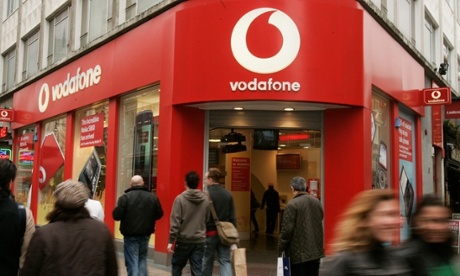Vodafone’s internet usage has surged by up to 50% in some European countries as consumers shift to working at home and turn to services such as Netflix because the coronavirus is keeping families indoors.
The increase in data comes from a wide range of activities, from children accessing educational material online, playing digital games and watching films and TV on multiple devices, as well as people working from home.
The world’s second largest mobile operator has almost 120 million customers in a dozen countries in Europe. It did not specify which countries have had the biggest spikes in data usage but it is likely to include Spain, Italy and France, where government shutdowns have kept the public indoors for an extended period.
Vodafone has 18 million customers in the UK, where data usage is already up 30% and is likely to rise as the government’s strategy follows that of its European neighbours. The group said in the UK data usage increases are starting much earlier in the day, from lunchtime, reflecting the switch to working from home. The peak of usage remains 6pm to 8pm.
Symptoms are defined by the NHS as either:
- a high temperature - you feel hot to touch on your chest or back
- a new continuous cough - this means you've started coughing repeatedly
NHS advice is that anyone with symptoms should stay at home for at least 7 days.
If you live with other people, they should stay at home for at least 14 days, to avoid spreading the infection outside the home.
After 14 days, anyone you live with who does not have symptoms can return to their normal routine. But, if anyone in your home gets symptoms, they should stay at home for 7 days from the day their symptoms start. Even if it means they're at home for longer than 14 days.
If you live with someone who is 70 or over, has a long-term condition, is pregnant or has a weakened immune system, try to find somewhere else for them to stay for 14 days.
If you have to stay at home together, try to keep away from each other as much as possible.
After 7 days, if you no longer have a high temperature you can return to your normal routine.
If you still have a high temperature, stay at home until your temperature returns to normal.
If you still have a cough after 7 days, but your temperature is normal, you do not need to continue staying at home. A cough can last for several weeks after the infection has gone.
Staying at home means you should:
- not go to work, school or public areas
- not use public transport or taxis
- not have visitors, such as friends and family, in your home
- not go out to buy food or collect medicine – order them by phone or online, or ask someone else to drop them off at your home
You can use your garden, if you have one. You can also leave the house to exercise – but stay at least 2 metres away from other people.
If you have symptoms of coronavirus, use the NHS 111 coronavirus service to find out what to do.
Source: NHS England on 23 March 2020
“Covid-19 is already having a significant impact on our services and placing a greater demand on our network,” the company said. “We should expect this trend of data growth to continue and we have already seen data traffic increase by 50% in some markets.”
Virgin Media has given almost three million of its mobile customers 10GB of free data as a gesture acknowledging they will be using their phones more as the country goes into lockdown.
The company, which has more than five million broadband customers, has also moved to scrap the 20Mbps usage cap that a few tens of thousands of broadband customers, mostly older customers on historic contracts, are still on to allow them to freely keep using the internet.
Wurl, a company that delivers video and advertising to connected TVs, estimates the amount of time people spent streaming rose more than 20% globally last weekend. In some countries, such as Austria and Spain, where telecoms companies have struggled with usage demands, there were 40%-plus increases in time spent streaming.
BT, which owns Openreach, the UK’s phone and broadband network, has said it can handle the huge increase in internet and data usage that is expected in the coming months in the UK.
Nick Read, the chief executive of Vodafone, revealed the data usage figures as part of a five-point plan the company was implementing to support communities and governments as the virus spreads.
It is increasing capacity across its networks, such as offering extra capacity to hospitals and GPs, for functions such as videoconferencing and better connectivity for healthcare workers.
The company is also offering governments the ability to disseminate information to the public via text alerts, which can also be targeted to residents in areas particularly affected by the virus.
“Vodafone can play a critical role in supporting society during this unprecedented time,” Read said. “We will strive to ensure that people stay connected to their family and friends, businesses can continue to run using remote working, our health services get all the support we can deliver and students can continue their education virtually.”











